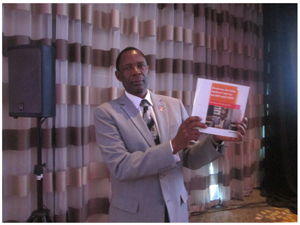
Business decision makers’ 2013 survey on HIV/AIDS launched

Minister of Health and Social Services Honourable Richard Kamwi at the launch.(Photograph by Melba Chipepo)
The aim of the survey is to gauge the response across various industries and business sizes as well as to collate success stories so that the business sector as a a whole is more empowered to respond effectively to the challenge of HIV/AIDS.
The survey which was conducted by PwC and NABCOA targets chief executive officers and other decisions makers in the economic sector in a bid to establish and illustrate the efforts being made to combat HIV/AIDS in the workplace. The qualitative and quantitative data in the survey is comprised of a sample of 50 companies from various sectors of the economy that were used to define the type of interventions currently utilised in an effort to more effectively manage the HIV/AIDS issues in the Namibian workplace.
The number of companies represent a 16 percent improvement on the 2007 survey sample of 43 companies. The survey shows that a significant amount of the health allocations are increasingly being spent on HIV/AIDS treatments and control, in the year 2008/09, the Ministry of Health and Social Services (MOHSS) spent an estimated N$2.7 billion on health financing while private companies spent N$605 million.
Speaking at the launch Minister of Health and Social Services Honourable Richard Kamwi said there is an urgent need for the public and private sectors to work together for the most efficient way of financing these efforts in light of increasing donor inputs. “The study results being presented are important in clarifying how we manage this new paradigm in responding to HIV specific and broader health challenges, as it gives us not just an insight into progress of health and HIV programmes in the workplace but also sends a message to all stakeholders, about what businesses want, what businesses need and how businesses should be engaged.”
Kamwi however said that despite the results of the survey seemingly showing that the battle is won and that the tide has been turned regarding HIV/AIDS, the scourge of HIV is far from over and we are actually at crossroads where we can either consolidate gains and move towards elimination of new infections, stigma and AIDS deaths or we can relax and watch as successes are reversed and renewed crisis is upon us.
“We must work hand in hand, government, civil society and private sector to ensure continued progress and gains. Treatment coverage must be increased. Value for money approaches with proven effectiveness in reducing deaths and new infections must be pursed relentlessly. New models of financing such as public private partnerships must be fostered and implemented. Homes, schools, clinics,places of worship and places of work all need to be utilised for their comparative advantage. We all need to move the conversation beyond the work place and integrate a response with the private sector”, he concluded.











































